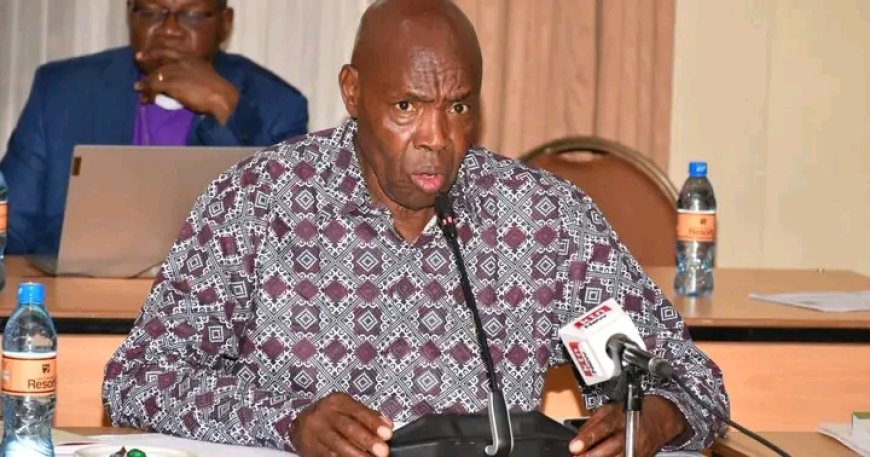Education CS roots for waiver on varsity pending bills

Naivasha
Saturday, September 2, 2023
KNA by Mabel Keya-Shikuku
Education Cabinet Secretary (CS) Ezekiel Machogu has said they are consulting with the National Treasury and other stakeholders to waive part of the huge Sh63 billion pending bills, facing Public Universities.
Machogu said they were now gathering reports from the various Universities and will discuss them with the government and other stakeholders in a committee that has been formed to see if Kenya Revenue Authority (KRA) can be allowed to waive the dues owed from Statutory deductions, which were not remitted such as Pay As You Earn and National Hospital Insurance Fund (NHIF) due to lack of funds, so that the universities can pay the other debts such as those owed to suppliers among others.
The CS said the pending bills totaling to Sh. 63Billion has accrued in the 32 public universities for over five to six years, due to inadequate funding from the Government.
“At that time the Government was using Differentiated Unit Cost (DOC), where the state would pay 80 per cent of the total cost of the course being undertaken by every student regardless of their social- economic standing and the cost of the course being undertaken,” he said.
The CS noted that that due to inadequate funding, only 68 per cent of the total funding required by public universities was disbursed in that period of six years leading to accumulation of debts.
Machogu was speaking when he met with the Senate Education Committee led by Murang`a Senator Joseph Nyutu in Naivasha Saturday.
Machogu said this equal funding for all Varsity students did not take into account the economic and social background of learners, but this has been cured by the new funding model, which categorizes learners into vulnerable, very needy, needy and less needy, which will ensure no needy child is left out due to lack of fees and that universities get adequate funding.
The new funding model, which was recommended and adopted by the cabinet is set to harmonize fees per course and address myriad fiscal challenges that have faced universities and Technical, and Vocational Education Training institutes.
In this new funding scheme, the government will cater 82 percent of fees through scholarships, while 18 percent will be catered by the Higher Education Loans Board (HELB) through loans that have been funded to the tune of Sh29 Billion this financial year.
The 32 public universities in the country (according to 2021 Ministry of Higher Education data) heave under a total debt of Sh. 62Billion, as at last year due to inadequate funding from the Government due to scarce resources.
Around 563,000 students were enrolled in universities in Kenya during the academic year 2022/23. The number increased from roughly 562,100 enrolled in universities in Kenya as at the beginning of the 2021 /22 academic year. Public universities largely rely on government subsidies to run their operations.
This financial year (2022/23), the National Treasury allocated only US$793 million (About sh.80Billion) for higher education. The universities had requested US$1.8 billion (about Sh.180Billion) from the government in their budget plans in order to be able to function effectively.
Machogu is optimistic that the new funding model will help the education sector in the country, adding that the Ministry was also implementing many of the recommendations of the presidential working committee on education, which were presented to the President earlier this year.
He said his ministry is engaging the National Treasury to unlock delays in disbursement of funds meant for education to look at how the government can hasten the release of capitation funds to the education institutions to ensure smooth continuity of learning activities.
He said the government has been allocating to sh. 22,240 for each learner in day Secondary, sh. 15,040 for Junior Secondary and those in Extra County and National Schools will pay sh. 53,000 per student for boarding and other amnesties and sh. 45,000 for learners in County category boarding schools.
“We plan to be paying 50 per cent of Government capitation to our schools during first term, 03 percent during the second term and 02 per cent touring third term for the smoot running of the schools,” Machogu said.
He said the government has also reduced the cost of Tertiary, Vocational Education Training (TVETs) fees per student to 13,000, a move which has seen the enrollment triple from 70,000 students to 300,000 in the last few years.
He said TVET is key in aligning and promoting training to learners to the best international standards and the government will ensure linkages with industries for learners to get technical experience as well as engage learners in government projects such as the affordable housing project.
The CS said up to 9,000 learners have opted to study in local TVETS institutions due to increasing demand of technical skilled manpower both in the local market and in other developed countries.
Machogu added that the ministry will also disburse capitation funds to special schools as well as increase the number of teachers and caregivers after the senators raised concerns about delays in the release of funding, which has hampered the level of training in their schools.
On his part, Nyutu said he was satisfied with the measures the Ministry was taking to address challenges in the education sector.
Courtesy ; K. N. A
What's Your Reaction?



































































































































































































































































































